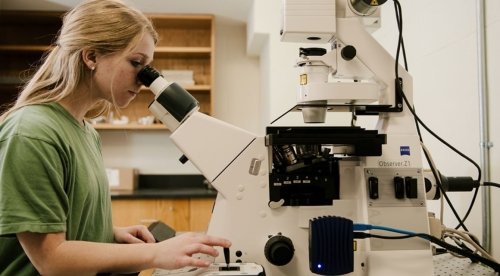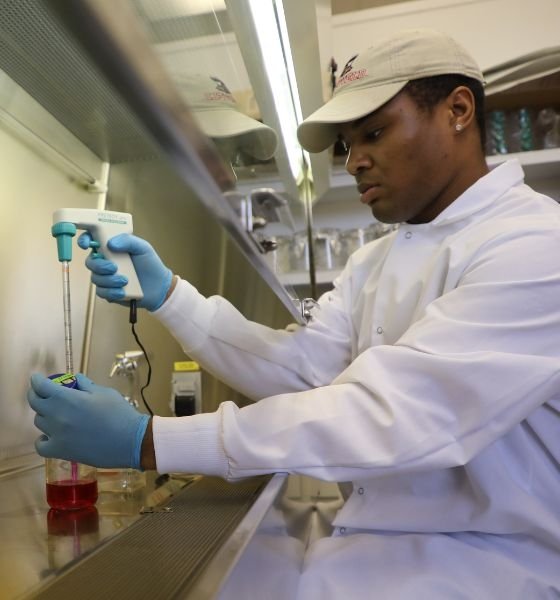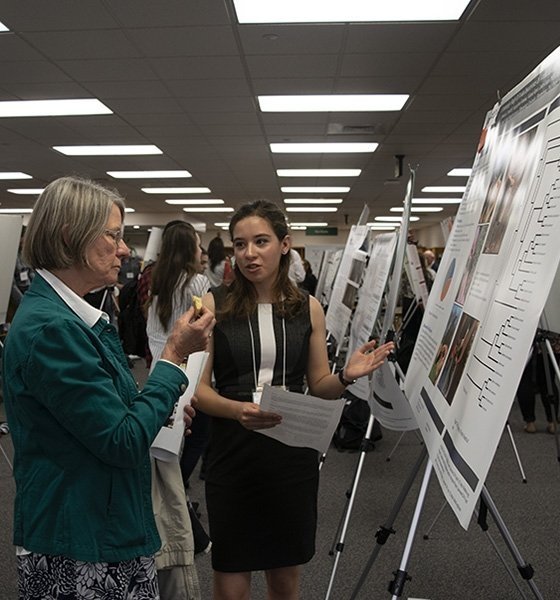
Biological Research
The faculty of the Biological and Health Sciences Department at Commonwealth University are committed to engaging with students in innovative research endeavors which impact the greater scientific community.
Graduate Research
The Department of Biological and Health Sciences offers a traditional research-based Biology Master of Science Program. Graduate studies entail a close working relationship between a student and a faculty member who acts as their Major Professor. The universal core of the program is an independent scholarly project which is planned, executed, and presented to the public under the direction of a Major Professor. Elective courses are also offered to develop specific competencies. The program is designed to be completed in 2 years, with full-time effort split roughly equally between research and course work. Every effort is made to closely match students with a faculty mentor and research advisor who is able to satisfy their interests and provide the resources necessary to support students’ scholarly work. If you would like to review all of the possible areas of scholarly specialization available, browser our online gallery of fields of study to see the research being conducted by Biology faculty and current students.
Undergraduate Research
The Department of Biological and Health Sciences strives to provide hands on, real word science experience to our undergraduate students. This includes many opportunities to work in a real laboratory or field-based setting, experiencing how scientific investigation really works. Students work side-by-side with faculty, other undergraduate students, and graduate researchers to design, execute and analyze real life experiments and studies. Undergraduate students can volunteer in research laboratories, do research for academic credit as part of the focused elective selection, and/or in some cases as a funded professional experience opportunity. BHS students are encouraged to explore research opportunities with faculty as early as their first semester, as part of their freshman seminar course, and can explore faculty research fields of study and potential projects through our online gallery. Research experiences provide students with analytical and problem-solving skills which are not only valuable for future researchers, but also for any student planning for careers in STEM, including the health sciences.
Environmental, Ecology and Field Biology
A large proportion of our faculty are focused on environmental and ecological research including Organismal Ecology of birds, mammals and insects as well as marine and stream ecosystems.
Research Interests
My current project will investigate the role of artificial wetlands on the foraging behavior and reproductive success of Tree Swallows. Most of my previous research focused on quantifying the effects of eutrophication and applying models to reduce nutrient loads into aquatic ecosystems.
For more information on Dr. Green's work visit her faculty profile.
Research Interests
My research expertise is in the ecological genetics and physiological ecology of animals. I study amphibians, reptiles and bees, but I also collaborate to study other taxa, providing expertise in ecological genetics or physiological ecology. I use numerous techniques (allozyme genetics, microsatellite DNA genotyping, mtDNA sequencing, western blotting, ELISA, and skeletochronology) to study heterozygosity-fitness relationships, population genetic structure, and the abundance, distribution, and the physiological ecology of animals. Currently, studies by my students and I investigate island dwarfism and coastal ecology of amphibians, island pollination systems, host-vector relationships for West Nile Virus, and stress responses in bees.
For more information on Dr. Hranitz's work visit his faculty profile.
Research Interests
My investigations have related to the functional aspects of invertebrate zoology. Most of these studies have focused upon physiological, behavioral, and ecological aspects of nutrition of echinoderms. Recent studies have emphasized impacts of climate change, particularly elevated sea surface temperatures and ocean acidification. This work upon novel challenges to sea animals has led to increased involvement in environmental policy and conservation efforts. In addition to these long standing areas of research, a new interest in the impacts of anthropogenic challenges, such as species introductions and climate change, upon the crayfish of Northeastern Pennsylvania has been fostered by ongoing collaborations with S. M. Hartzell.
Keywords: Invertebrate Zoology, Marine Biology, Nutritional Behavior and Ecology, Aquaculture, Impacts of Climate Change on Marine Ecosystems, Conservation.
For more information on Dr. Klinger's work visit his faculty profile.
Research Interests
Projects included
- High resolution monitoring of phosphorus dynamics in Fishing Creek
- Phosphorus pulses and polyphosphate dynamics in streams
- Agriculture impacts on stream ecosystem function and the development of rapid functional indicators
- Measuring performance of best management practices installed as part of the implementing precision conservation in the Susquehanna River Watershed
- Algal priming of course particulate organic matter decomposition in streams
Keywords: Stream Ecosystem Ecology, Algal and Microbial Ecology, Water Pollution
For more information on Dr. Rier's work visit his faculty profile.
Research Interests
In 2018, Dr. Wood collaborated with undergraduate students on projects to assess learning gains in biology courses, to measure decomposition in forest soils and contribute to a global decomposition database, and to document behavior and space use by grey squirrels and eastern chipmunks on campus.
Keywords: Foraging Behavior, Mammalogy, Forest Ecology, Biology Education
For more information on Dr. Wood's work visit her faculty profile.
Research Interests
In 2018, Dr. Corbin continued his student-based research program by mentoring Masters and undergraduate students in projects including museum collections, ecological morphology, foraging ecology, and birds and West Nile virus.
Keywords: Evolutionary Ecology, Foraging Ecology, Functional Anatomy
For more information on Dr. Corbin's work visit his faculty profile.
Current and Recently Completed graduate students and their projects can be found at our Graduate Research Directory.
Cell, Molecular Biology, and Genetics
The research focus of many of our faculty incorporates cellular and molecular biology techniques as well as genetic analysis. Projects range from the study of human cancers, studying signaling in model organisms, neural and reproductive physiology.
Research Interests
Our laboratory focuses on using cell culture and molecular biology techniques to understand the pathways which regulate the transcription and replication of eukaryotic telomeres. More specifically I am focused on the mechanism by which the genome binding factor CTCF, and its only paralog BORIS are participating in the maintenance of telomere structures and how these functions may be important in cancer and normal cellular aging. Recent students have been working to develop cell models and methods to understand BORIS function at telomeres and analyzing how CTCF effects the replication of the telomeres and potential other regions throughout the genome.
For more information on Dr. Beishline's work visit her faculty profile.
Research Interests
My research interests lie in the regulation of the stress response in bees. I have been studying transcription factors that aid in the survival of invasive bees in conditions where honey bees would normally not survive. Students working under my supervisions have cloned, sequenced and characterized expression of factors linked to stress response and survival, daf-16, hsf-1, and nrf2 in Megachile rotundata, a solitary thermotolerant bee. Summer of 2017, we also looked at expression of a hypoxia related factor, hif1α, in response to heat stress. This past year, in collaboration with Dr. John Hranitz, we conducted experiments to verify changes in genes linked to stress, behavior and metabolism in honey bees in response to ethanol.
In 2016, I applied for a yearlong sabbatical, which was approved for the Spring/Fall 2018 semesters. In fall of 2017, my students and I treated honey bees with ethanol (or control) and isolated RNA for real time PCR experiments. We conducted these experiments to study gene expression changes indicated by an initial microarray experiment. In the spring/fall 2018 semesters, my students and I conducted real- time PCR experiments to verify gene expression changes in hsc70-4, nrf2, egln1 and foxp2 to name a few genes, in the ethanol treated bee samples. One of my students, Justin Heller, decided to work with me on his Master’s degree pursuing genes in alcohol tolerance starting the fall 2018 semester.
For more information on Dr. Brubaker's work visit her faculty profile.
Research Interests
Keywords: Synaptic Physiology, Molecular Regulation of Cellular Secretion
For more information on Dr. Coleman's work visit his faculty profile.
Research Interests
Keywords: Genetics of Neurodevelopmental Disorders, Human Genetics, Bioinformatics
For more information of Dr. Hare-Harris's work visit her faculty profile.
Research Interests
My lab explores the molecular mechanisms that promote melanoma development and progression to a metastatic phenotype. I focus specifically on the receptor tyrosine kinase, EphA2, whose expression is increased in highly aggressive melanomas. Current research projects are aimed at investigating the role of melanoma tumor cell plasticity and EphA2 in mediating resistance to the clinical inhibitors vemurafenib and dabrafenib.
For more information on Dr. Hess's work visit her faculty profile.
Research Interests
My research laboratory is dedicated to understanding the neuroendocrine mechanisms underlying diseases of energy dysregulation (e.g. obesity, anorexia). These mechanisms are studied from an evolutionary perspective – traits evolve if they increase reproductive success. Therefore, we examine both ingestive as well as reproductive behaviors simultaneously, using zebrafish as our animal model.
For more information on Dr. Klingerman's work visit her faculty profile.
Research Interests
Keywords: Andrology, fertilization, and sperm architecture/morphology.
For more information on Dr. Venditti's work visit her faculty profile.
Research Interests
Foraging Behavior, Mammalogy, Forest Ecology, Biology Education. In 2018, Dr. Wood collaborated with undergraduate students on projects to assess learning gains in biology courses, to measure decomposition in forest soils and contribute to a global decomposition database, and to document behavior and space use by grey squirrels and eastern chipmunks on campus.
For more information on Dr. Wood's work visit her faculty profile.
Current and Recently Completed graduate students and their projects can be found at our Graduate Research Directory.
Health Sciences and Human Physiology
Several faculty are focused on human health and physiology projects to better understand health and disease.
Research Interests
Our laboratory focuses on using cell culture and molecular biology techniques to understand the pathways which regulate the transcription and replication of eukaryotic telomeres. More specifically I am focused on the mechanism by which the genome binding factor CTCF, and its only paralog BORIS are participating in the maintenance of telomere structures and how these functions may be important in cancer and normal cellular aging. Recent students have been working to develop cell models and methods to understand BORIS function at telomeres and analyzing how CTCF effects the replication of the telomeres and potential other regions throughout the genome.
For more information on Dr. Beishline's work visit her faculty profile.
Research Interests
Keywords: Genetics of Neurodevelopmental Disorders, Human Genetics, Bioinformatics
For more information of Dr. Hare-Harris's work visit her faculty profile.
Research Interests
My lab explores the molecular mechanisms that promote melanoma development and progression to a metastatic phenotype. I focus specifically on the receptor tyrosine kinase, EphA2, whose expression is increased in highly aggressive melanomas. Current research projects are aimed at investigating the role of melanoma tumor cell plasticity and EphA2 in mediating resistance to the clinical inhibitors vemurafenib and dabrafenib.
For more information on Dr. Hess's work visit her faculty profile.
Research Interests
My research expertise is in the ecological genetics and physiological ecology of animals. I study amphibians, reptiles and bees, but I also collaborate to study other taxa, providing expertise in ecological genetics or physiological ecology. I use numerous techniques (allozyme genetics, microsatellite DNA genotyping, mtDNA sequencing, western blotting, ELISA, and skeletochronology) to study heterozygosity-fitness relationships, population genetic structure, and the abundance, distribution, and the physiological ecology of animals. Currently, studies by my students and I investigate island dwarfism and coastal ecology of amphibians, island pollination systems, host-vector relationships for West Nile Virus, and stress responses in bees.
For more information on Dr. Hranitz's work visit his faculty profile.
Research Interests
My research laboratory is dedicated to understanding the neuroendocrine mechanisms underlying diseases of energy dysregulation (e.g. obesity, anorexia). These mechanisms are studied from an evolutionary perspective – traits evolve if they increase reproductive success. Therefore, we examine both ingestive as well as reproductive behaviors simultaneously, using zebrafish as our animal model.
For more information on Dr. Klingerman's work visit her faculty profile.
Research Interests
Research Interests My research interest is in G-protein coupled signal transduction. G-proteins initiate the cellular response to activation of cell surface receptors for numerous signals including hormones, neurotransmitters, paracrine factors, odorants, and light. G-proteins are composed of three subunits, an α-subunit and a βγdimer; each of these subunits is encoded by a gene family. My aim is discover the specific roles of individual G-protein γ-subunits in signal transduction.
For more information on Dr. Schwindinger's work visit his faculty profile.
Research Interests
Keywords: Andrology, fertilization, and sperm architecture/morphology.
For more information on Dr. Venditti's work visit her faculty profile.
Current and Recently Completed graduate students and their projects can be found at our Graduate Research Directory.
Organismal Biology and Natural Sciences
A number of faculty are conducting laboratory and field based investigations in animal behavior with both modern and evolutionary perspectives.
Research Interests
In 2018, Dr. Corbin continued his student-based research program by mentoring Masters and undergraduate students in projects including museum collections, ecological morphology, foraging ecology, and birds and West Nile virus.
Keywords: Evolutionary Ecology, Foraging Ecology, Functional Anatomy
For more information on Dr. Corbin's work visit his faculty profile.
Research Interests
My current project will investigate the role of artificial wetlands on the foraging behavior and reproductive success of Tree Swallows. Most of my previous research focused on quantifying the effects of eutrophication and applying models to reduce nutrient loads into aquatic ecosystems.
For more information on Dr. Green's work visit her faculty profile.
Research Interests
My research expertise is in the ecological genetics and physiological ecology of animals. I study amphibians, reptiles and bees, but I also collaborate to study other taxa, providing expertise in ecological genetics or physiological ecology. I use numerous techniques (allozyme genetics, microsatellite DNA genotyping, mtDNA sequencing, western blotting, ELISA, and skeletochronology) to study heterozygosity-fitness relationships, population genetic structure, and the abundance, distribution, and the physiological ecology of animals. Currently, studies by my students and I investigate island dwarfism and coastal ecology of amphibians, island pollination systems, host-vector relationships for West Nile Virus, and stress responses in bees.
For more information on Dr. Hranitz's work visit his faculty profile.
Research Interests
My research laboratory is dedicated to understanding the neuroendocrine mechanisms underlying diseases of energy dysregulation (e.g. obesity, anorexia). These mechanisms are studied from an evolutionary perspective – traits evolve if they increase reproductive success. Therefore, we examine both ingestive as well as reproductive behaviors simultaneously, using zebrafish as our animal model.
For more information on Dr. Klingerman's work visit her faculty profile.
Current and Recently Completed graduate students and their projects can be found at our Graduate Research Directory.
Cross-Department Research Collaboration
Faculty across the university conduct Biologically relevant independent research or collaborate with biology faculty on projects focused on various aspects of Health, Molecular, Environmental biology, and natural history.
Research Interests
Keywords: evolution of form, function, and behavior in living and fossil organisms, taphonomy, and sedimentology and stratigraphy.
For more information on Dr. Gishlick's work visit his faculty profile.
Research Interests
I changed my major from Business Administration to Psychology after my sophomore year because I imagined that I would be miserable if I pursued a career in business. I enjoy training young researchers who might someday pursue important lines of research in a health-related field.
For more information on Dr. Ball's work visit his faculty profile.
Research Topics
Graduate research with Professor Muriel Maurer: Compared activation and substrate specificity of thrombin for a common polymorphism of Factor XIII and other mutants versus the wild-type Factor XIII by HPLC kinetic, 1-D proton line broadening NMR, 2-D TOCSY NMR, and 2-D transferred NOESY NMR techniques. Peptide purification and analysis by RP-HPLC and MALDI-TOF mass spectrometry. Activation and purification of thrombin utilizing HPLC, size exclusion chromatography, cation exchange chromatography, SDS-PAGE, and MALDI-TOF mass spectrometry. Expression of FXIII in S. cerevisiae and purification, further using the methods mentioned for thrombin plus Western blotting.
For more information on Dr. Bell's Work visit her faculty profile.
For more information on Dr. Franek's Work visit her faculty profile.
Current and Recently Completed graduate students and their projects can be found at our Graduate Research Directory.

Student Funding for Research
In addition to a number of faculty funding sources for research, students who complete research in the department of Biological and Health Sciences are eligible for graduate and undergraduate research funding programs including the University Professional Experience Grants Program, the Undergraduate Research and Creative Activities Summer Program, and funding from local and national agencies and organizations including the Commonwealth of Pennsylvania University Biologists, Pennsylvania Academy of Science, and Tri Beta National Biological Honor Society.

Research Presentations and Publication
Student researchers not only conduct independent research projects but also gain invaluable experience writing and presenting their research to the public. Students present yearly on campus at the COST Research Symposium, locally at various research meetings including the Susquehanna Valley Undergraduate Research Symposium, and even nationally.

Undergraduate and Graduate Programs
Our Department of Biological and Health Sciences hosts a range of specialties from molecular biology to ecology, from cell biology to whole organisms, from microbes to animals and plants. Courses are taught by Ph.D. faculty with extensive research experience who emphasize hands-on learning, practical skills, and critical thinking. Small classes allow individual attention and encourage participation.

